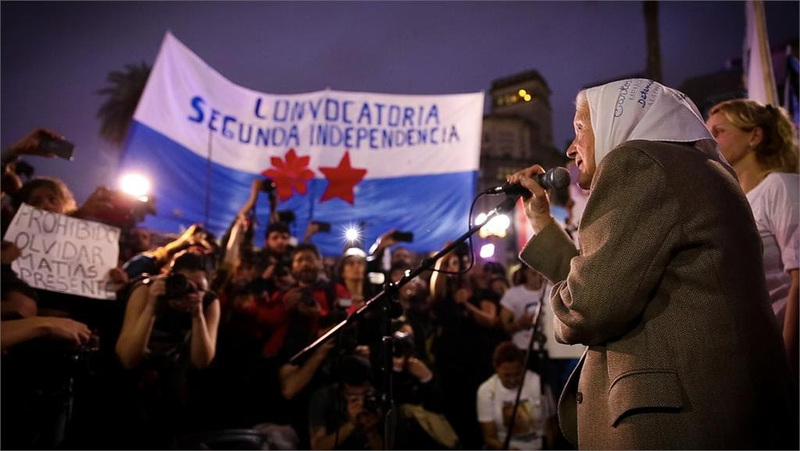
One Voice, Loud Enough to Shake a Nation
MOVIE REVIEW
Norita
–
Genre: Documentary
Year Released: 2024, 2025
Runtime: 1h 30m
Director(s): Jayson McNamara, Andrea Tortonese
Languages: English, Spanish with English subtitles
Where to Watch: showing June 1, 2025, at The Roxie Theater for the 2025 San Francisco Documentary Festival
RAVING REVIEW: Some documentaries linger in the mind because of the magnitude of their subject. Others hold you because of how the story is told. NORITA manages to do both. It doesn't just present a portrait of Nora Cortiñas—it refuses to let her become a passive symbol of grief. Instead, it insists on the power of staying angry, staying present, and refusing to vanish.
Directed by Jayson McNamara and Andrea Tortonese, this documentary builds its case not through melodrama or manipulation, but with a steady accumulation of truth, memory, and relentless clarity. Nora—“Norita”—is introduced not as a sainted relic of Argentina’s past, but as a woman who has carried history on her back while continuing to walk forward. Her story begins with one of the darkest chapters in Latin America’s modern era, but the film ensures we don’t box her in there. She is not an artifact. She’s still marching.
The disappearance of her son, Gustavo, under Argentina's brutal military dictatorship in 1977, is what pulled Norita into public life. The film then charts her evolution from a suburban homemaker into a human rights powerhouse. But what distinguishes NORITA from other documentaries is that it doesn’t treat activism as a reaction to grief—it positions it as a force that transforms and reshapes that grief into something dangerously effective.
The film's structure mirrors Norita’s activism. It’s not linear; it’s persistent. The narrative jumps from past to present without warning, but rather than feeling disjointed, it evokes how trauma resurfaces: uninvited, unresolved, and ongoing. McNamara and Tortonese handle this fluidity with care. There’s no artificial closure offered, and that’s exactly right. Norita never got closure, and she doesn't pretend she did.
Her presence alone carries most of the emotional weight, and the film trusts her enough to let that stand. It allows her frustration to come through. It includes moments where her pain seems ready to overtake her mid-sentence. It honors her contradictions—this woman has spent over four decades as a grieving mother and an uncompromising political voice. That duality is part of what makes her fascinating.
It isn't just a documentation of a life—it’s a call to confront how history continues to repeat, often dressed in new disguises but with the same cold indifference toward the marginalized. That’s where NORITA excels—not just as a biography, but as a confrontation. The interviews offer important perspective, but Norita’s voice guides the emotion. Her pain is political, and her politics are personal. The weight of her loss is never exploited. Instead, it becomes the foundation for her insistence that no one else be forced into silence.
There's something deeply confrontational about how the documentary resists martyrdom. Norita isn’t perfect, nor does the film pretend she is. But it argues that perfection was never the point. Persistence was. The refusal to give in, the insistence on truth, and the ability to age without softening your stance are the qualities it champions. And they’re rare.
For viewers unfamiliar with Argentina’s “Dirty War” and the forced disappearances of thousands, NORITA functions as both education and indictment. But for those who already know this history, it still manages to surprise. The scope of Norita’s endurance, the tenacity of her spirit, and the unapologetic way she holds the powerful accountable—these are things you can’t become numb to, no matter how well you think you know the story.
If there's one note of caution, it’s that the film assumes a degree of context. There are moments where a deeper primer on Argentina’s political shifts could help those coming to this history cold. Still, it never feels inaccessible—just demanding. And maybe that’s intentional. Norita never lowered her voice for comfort; why should her documentary?
Ultimately, this is not a film about closure. It's a film about not letting closure become an excuse for forgetting. It insists on memory not as nostalgia, but as resistance. And in that way, it’s just like its subject.
Please visit https://linktr.ee/overlyhonestr for more reviews.
You can follow me on Letterboxd, Instagram, Twitter, and YouTube. My social media accounts can also be found on most platforms by searching for 'Overly Honest Reviews'.
I’m always happy to hear from my readers; please don't hesitate to say hello or send me any questions about movies.
[photo courtesy of DOCTORA STORIES, TIDETIVITY STUDIOS]
DISCLAIMER:
At Overly Honest Movie Reviews, we value honesty and transparency. Occasionally, we receive complimentary items for review, including DVDs, Blu-rays, CDs, Vinyl Records, Books, and more. We assure you that these arrangements do not influence our reviews, as we are committed to providing unbiased and sincere evaluations. We aim to help you make informed entertainment choices regardless of our relationship with distributors or producers.
Amazon Affiliate Links:
Additionally, this site contains Amazon affiliate links. If you purchase through these links, we may receive a commission. This affiliate arrangement does not affect our commitment to honest reviews and helps support our site. We appreciate your trust and support in navigating these links.



Average Rating